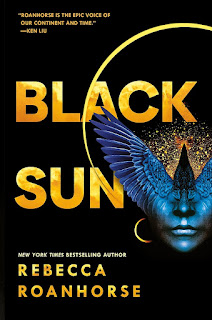 |
| Originally published: 2020 Acquired: June 2021 Read: July 2021 |
For some reason, I often dread opening an epic fantasy novel. I've convinced myself I don't like the genre. But then I start reading it and I'm really into it: I love the way you bounce between disparate characters and, between them, slowly start to assemble a picture of the world—a picture that the very nature of the genre means the main characters are seeking to change. The early stages of Black Sun do this kind of thing very well, and I was utterly absorbed; I found this much more up my street than I did Roanhorse's previous Hugo Award for Best Novel finalist, Trail of Lightning. The world was complex and interesting, and like a lot of recent sff, paid good attention to the interaction between cultures and issues of colonization.
Yet, somewhere this book lost me. I think it's because ultimately the characters' actions stopped ringing true at some point. There's a mercenary ship captain on a mission, a mission which becomes increasingly difficult. At a certain point, it became impossible for me to believe that she had a motivation to keep going. Now, I could imagine that even though she clearly wasn't going to make any money anymore, some point of pride or hidden nobility would make her keep going on regardless... but Roanhorse didn't convince me of this if that is what she was going for. Similarly, there's a high priestess who never remotely convinced me that she had the political savvy to become a high priestess in the first place; she gets outwitted by her opponents at every turn. There's one viewpoint character who's in the book so little, and who does so little, that it felt to me like all his scenes must have been added in rewrites very late in the composition process to set up a role in book two.
Anyway, I guess what I'm saying is this book has the things I like about epic fantasy... but in the end it made me remember why it's a genre I typically don't read very much of.
No comments:
Post a Comment